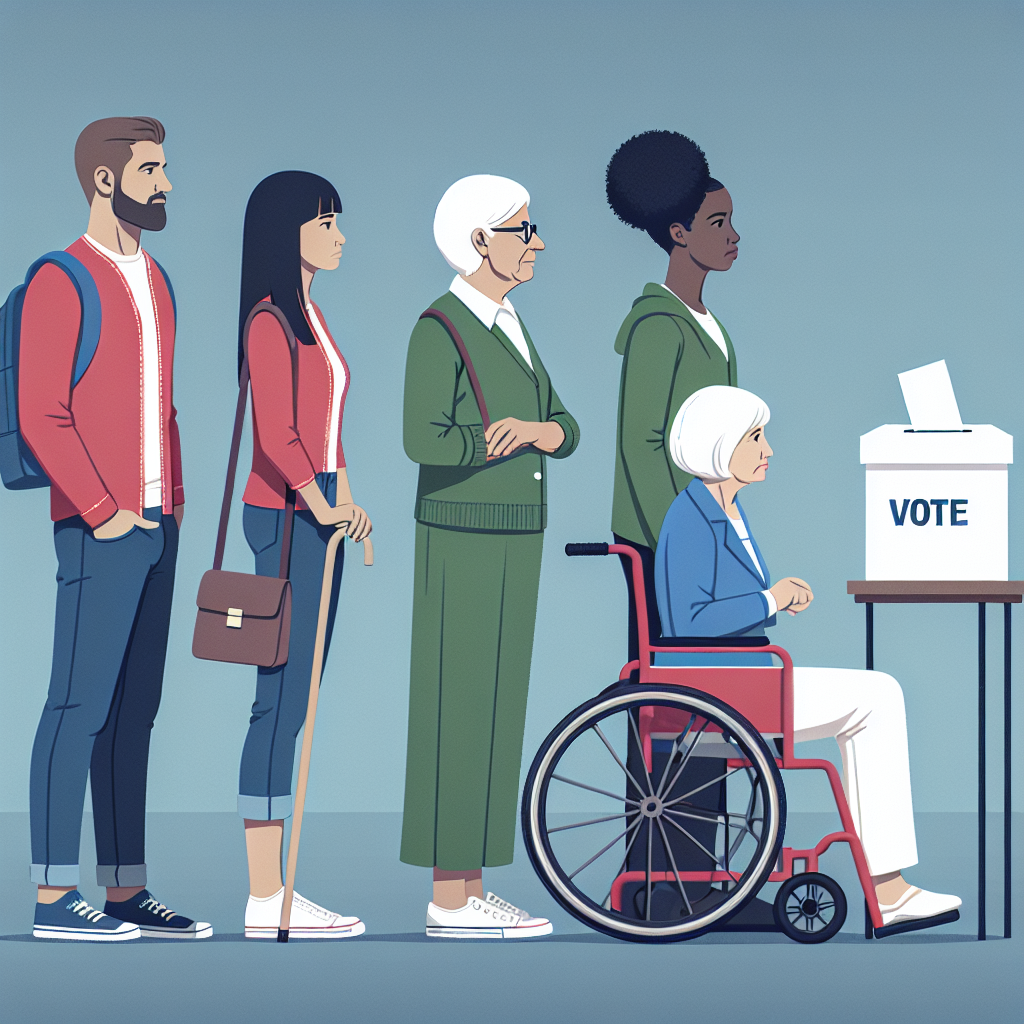
The importance of voter participation in a democracy cannot be overstated. As we navigate the complexities of our political landscape in 2025, it is evident that each vote is a powerful tool that shapes the future of our communities, states, and nation. Engaging in the democratic process ensures that every citizen’s voice is heard and contributes to the collective decision-making that affects our lives. Understanding the significance of voter participation not only fosters civic responsibility but also upholds the very foundation of democracy.
The Role of Voter Participation in Shaping Democracy
Voter participation is fundamental to the health of any democracy. A high turnout reflects an engaged citizenry that takes its rights and responsibilities seriously. When citizens participate in elections, they endorse the government’s legitimacy and strengthen the representative nature of governance. Each election presents an opportunity for individuals to express their views, demand accountability, and influence policies that affect their daily lives. In 2025, as new issues arise—ranging from climate urgency to economic equity—voter participation becomes even more crucial. Engaged citizens can advocate for legislative solutions that address immediate concerns, ensuring their needs are met.
Moreover, voter participation fosters a culture of civic engagement that extends beyond the ballot box. When individuals actively vote, they are more likely to engage in discussions about political issues, attend town hall meetings, and contribute to community efforts aimed at improving society. Such engagement builds a more informed electorate, which is essential for a thriving democracy. In a world where misinformation can spread rapidly, a knowledgeable voter base is vital in countering false narratives and ensuring that democratic processes function correctly.
The Consequences of Low Voter Turnout
Low voter turnout can have dire consequences for democracy. When fewer people vote, the resulting election outcomes often represent a narrow segment of the population, skewing policy decisions and neglecting the broader populace’s needs. This is particularly evident in local elections, where turnout can dip significantly. In 2025, we see that when voter participation drops, the elected officials may not have a comprehensive understanding of the community’s diverse needs, leading to policies that fail to represent all constituents, particularly marginalized groups.
Furthermore, low voter turnout breeds apathy. When citizens feel that their votes do not matter, they may be less likely to engage in future elections, perpetuating a cycle of disengagement and underrepresentation. This can lead to a lack of accountability from elected officials, who may not feel the pressure to address pressing issues like social justice, healthcare, or education reforms. To combat this, continuous voter education and outreach efforts are essential to ensure that every voice is valued and heard, creating a more inclusive and responsive political environment.
Strategies to Enhance Voter Participation
Encouraging voter participation necessitates strategic efforts at multiple levels, involving grassroots organizations, governmental initiatives, and educational programs. In 2025, technology plays a significant role in this strategy. From online voter registration to social media campaigns that raise awareness about upcoming elections, technology provides innovative ways to engage citizens. Outreach programs targeting younger voters, especially through platforms they frequent, help bridge the gap and ensure that the new generation is motivated to exercise their voting rights.
Another effective strategy lies in simplifying the voting process. Legislative measures like automatic voter registration, extended early voting days, and mail-in ballots cater to diverse needs and lifestyles, ensuring that more individuals can participate. Accessibility is key; ensuring that polling places are within reach for all voters, including those with disabilities, reflects our commitment to equality in democratic participation. As we continue to evolve in 2025, integrating flexible voting options not only improves turnout but also enhances the overall voter experience.
Moreover, civic education plays a pivotal role in enhancing voter participation. Schools and community organizations should prioritize educating citizens about the voting process, the significance of their votes, and how local issues relate to broader political trends. Programs that engage citizens in discussions about democracy, rights and responsibilities, and the impact of various policies foster an informed electorate empowered to make choices aligned with their values and beliefs.
The Impact of Voter Participation on Policy Decisions
Voter participation directly influences policy decisions at every government level, from local cities to the federal government. Elected officials who are aware that they represent an active and engaged constituency are more likely to prioritize policies that resonate with voters. In 2025, this has become clear as communities increasingly vote on critical issues like environmental protection, public health, education reform, and infrastructure funding. Every vote cast carries the power to steer legislative agendas, aligning them closer to the electorate’s needs and aspirations.
Moreover, when voter participation is high, it often leads to more competitive races. Candidates must respond to the concerns of a broader audience, leading to a richer dialogue during elections. This competition can spur innovative policy proposals as candidates seek to distinguish themselves, leading to more effective governance and a wider array of solutions to complex issues. In turn, increased voter engagement elevates the quality of debate, ultimately benefiting the democratic process.
Additionally, significant voter participation reinforces the idea that public officials must be accountable to their constituents. When citizens actively engage in the electoral process, they set a precedent for transparency and responsiveness among elected officials. The pressure on politicians to deliver results based on the promises made during campaigns grows stronger, fostering a government that is more accountable and susceptible to the will of the people.
The Role of Media in Promoting Voter Participation
In 2025, the media plays a critical role in shaping public opinion and promoting voter participation. Traditional outlets along with digital platforms have the power to inform citizens about the significance of their votes and upcoming elections. Investigative journalism shines a light on voter suppression tactics and educates the public about their rights, ensuring that all citizens are well-informed about the electoral process. Coordination between media organizations and civic engagement campaigns can amplify messages that encourage individuals to consider the importance of each vote in preserving democracy.
Social media’s influence cannot be underestimated either. Platforms like Twitter, Facebook, and Instagram have become vital tools for mobilizing voters, especially younger demographics. In 2025, campaigns utilize these channels to share important information about registration deadlines, polling locations, and key issues to be voted on, creating powerful networks of informed individuals ready to participate. Social media advocacy underscores the idea that every voice matters, reaching individuals who might not otherwise engage through traditional means.
However, the media also bears the responsibility of tackling misinformation that can deter voter participation. In an age where fake news can proliferate, ethical journalism is paramount. Media organizations must ensure that they provide accurate information and fact-checking, empowering citizens to make informed decisions. Creating trust in the information sources not only aids in higher voter turnout but strengthens democratic processes overall.
Conclusion
Voter participation stands as a cornerstone of democracy in 2025, holding the remarkable power to influence not only individual communities but the entire nation. High turnout rates reflect an engaged citizenry, while low rates can lead to underrepresentation and diminished trust in government. As we navigate new challenges and explore effective strategies to enhance participation—from leveraging technology to fostering civic education—the importance of each vote cannot be overlooked. A healthy democracy thrives when its citizens actively engage, holding their leaders accountable and advocating for the issues that matter most. Citizens must recognize that participation is not merely a right but a responsibility; every vote contributes to shaping the trajectory of their communities and society as a whole.
FAQs Section
Why is voter participation important in a democracy?
Voter participation is crucial because it ensures that all voices are heard, promoting representative government, accountability, and active civic engagement that shapes laws and policies impacting society.
What are the effects of low voter turnout?
Low voter turnout can result in policy decisions that represent only a small fraction of the population’s views, leading to the neglect of the needs of underrepresented groups and fostering government apathy.
What strategies can increase voter participation?
Effective strategies include leveraging technology for voter registration and outreach, simplifying the voting process, and implementing civic education programs to empower citizens to understand the importance of their vote.
How does voter participation affect policy decisions?
High voter participation influences elected officials to prioritize policies that reflect the electorate’s interests, fosters a competitive political environment, and encourages government accountability through active engagement.
What role does the media play in promoting voter participation?
The media serves to inform citizens about elections, combat misinformation, foster engagement through social media platforms, and hold public officials accountable, thus reinforcing democratic principles and encouraging voter turnout.
Democracy versus Autocracy: A Global Perspective
16. Dezember 2025The Impact of Sanctions on Global Trade Dynamics
16. Dezember 2025Geopolitical Tensions in the South China Sea
16. Dezember 2025
Leave a reply Antwort abbrechen
-
Understanding the Divide: Urban vs. Rural Political Perspectives
21. November 2025 -
Unforgettable Moments in Olympic History
3. Dezember 2025 -
How Weather Conditions Affect Soccer Game Scores
15. Juli 2025





